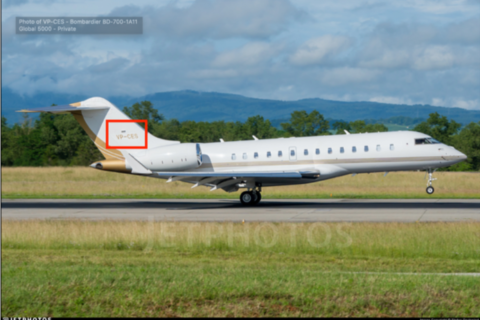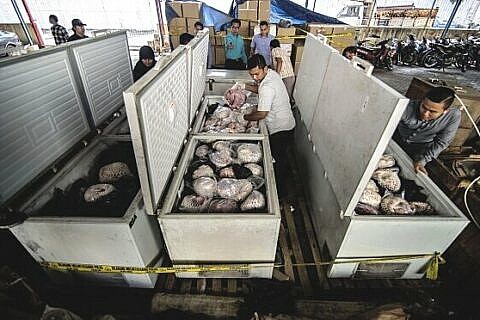Assets in Flight
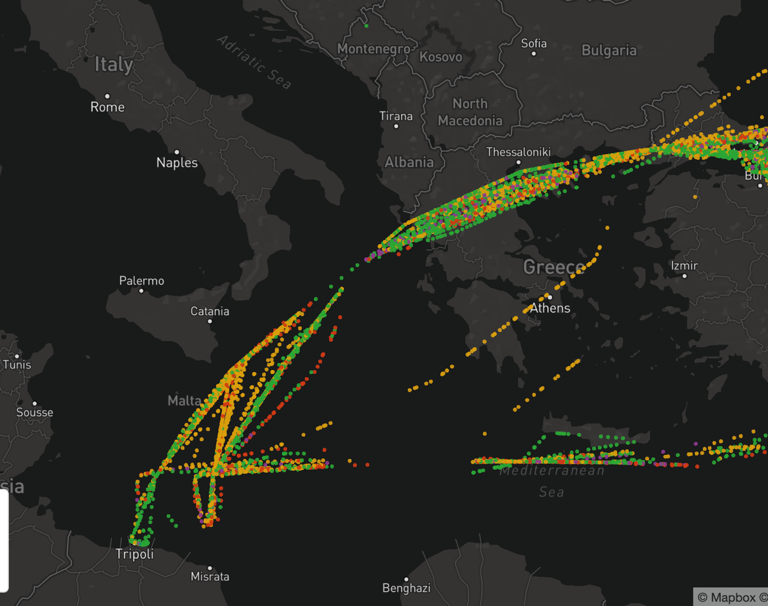
An examination of Libya’s aerial supply operations, revealing potential ownership and management ties between Libya’s flying armories and air freight providers in Libya, Eastern Europe, Turkey, and the UAE.
This is part of a series called “Assets in Flight” that specifically exposes the logistical architecture that has for years channeled weapons, materiel, and personnel in and out of Libya, often using commercial businesses and aircraft that are identifiable through open source research.
On December 26, 2019, Turkish President Recep Tayyip Erdogan announced provisional plans to deploy Turkish troops to Libya in defense of the UN-backed Government of National Accord (GNA). Since April 2019, the GNA has faced a months-long offensive led by rival leader, General Khalifa Haftar and the Libyan National Army (LNA). Days later, social media outlets, including Twitter, erupted in multiple posts alleging the deployment of Syrian rebels in and around Tripoli. Open-source plane spotters elsewhere identified aircraft transiting between Turkey and Libya, including one operated by Aerotranscargo, a Moldova-based company that in 2017, appeared in a UN Panel of Experts report as one of several Eastern European air freight providers that have operated suspicious flights into Libya, some of which are linked to potentially illicit weapons transfers.
The aerial re-supply of weapons, materiel, and personnel into conflict zones is not new. However, recent advancements in open source research tools and techniques – especially in publicly accessible flight data – have opened a new frontier in conflict reporting. Using these tools, researchers and investigators can connect conflict events with the underlying logistics that enable the commission of violence and mass atrocities.
In Libya, the sprawling corporate and logistics networks that connect Europe, Turkey, Sudan, the UAE, Qatar and other regional neighbors have their origins in decades of instability and state collapse on multiple continents. Far from relics of a past era, companies in these jurisdictions have serviced rival factions in the ongoing Libyan civil war now entering its 6th year of sustained conflict.
Using flight data and corporate records, the Conflict Finance and Irregular Threats (CFIT) team at C4ADS takes a deeper look at these aerial supply operations, revealing potential ownership and management ties between Libya’s flying armories and air freight providers in Libya, Eastern Europe, Turkey, and the UAE. This series specifically exposes the logistical architecture that has for years channeled weapons, materiel, and personnel in and out of Libya, often using commercial businesses and aircraft that are identifiable through open source research.
Libya’s TransNational Weapons Air Bridge #
On September 27, 2006 an Ilyushin IL-76TD cargo aircraft (Registration number: 5A-DQA) touched down in Baidoa, Somalia carrying two armored vehicles and an unspecified number of senior Ugandan military officers. The plane, which traveled from Kufra, Libya on its way to Baidoa, was reportedly operated by Global Aviation and Services Group (GASG), a chartered air freight service provider based in Tripoli, Libya. Seven years later, GASG appeared on an air waybill issued for the unofficial transfer of several thousand Caracel F Pistols, which the UN report stated were purchased by a US-based company and exported by UAE-based Caracel International LLC to Libyan forces then-organized under the Ministry of Interior in Mitiga, Libya.
UN investigators found that the transfer to Libya was one of several potential embargo violations reportedly aided by air freight companies such as GASG. UN investigators specifically found operational ties between air freight companies operating between Libya, Eastern Europe, Turkey, and the United Arab Emirates (UAE), though the relationship between these operators was not fully explored.
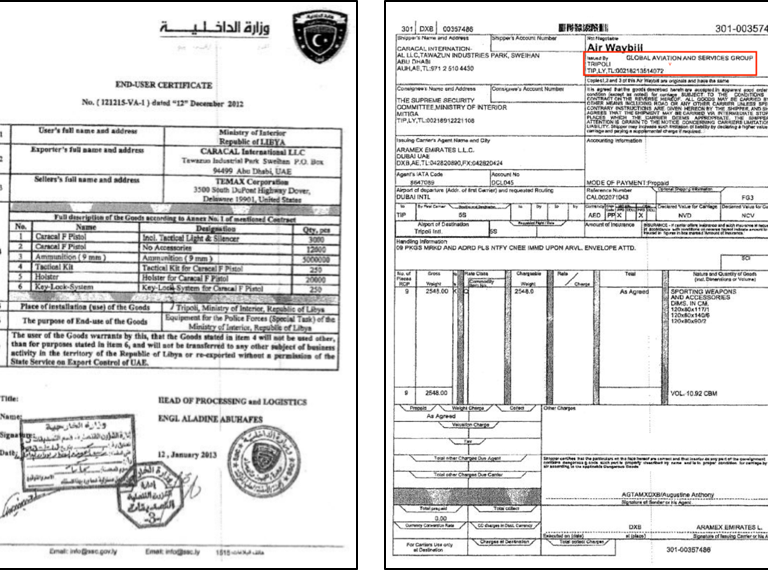
Tracing Global Aviation and Services Group (GASG) Ownership and Management #
Despite the lack of publicly available commercial registries in Libya, C4ADS used open data sources – including social media – to identify and verify GASG’s ownership and management as well as the company’s aerial operations.
Global Aviation and Services Group (GASG) was founded in 2003 and headquartered in Tripoli, Libya with offices in Benghazi and Istanbul, Turkey. A 2006 version of the company’s website identified a “Captain Abdussalam I. Aradi” as the company Chairman and Managing Director alongside several other company officials. GASG’s chairman separately appeared as “Abdussalam Aradi” according to a Linkedin Profile that seems to be registered to the company’s managing director. An open-source review of Facebook accounts registered under the name: “Abdussalam Aradi” elsewhere revealed an account with several profile photos that seemingly resemble Captain A. Aradi’s likeness.
On January 21 2014, an image from a business article identified a “Capt. A. Aradi” as Chairman of GASG during a meeting with officials from Skylink Aviation, an air cargo company which operates in several conflict areas including in Afghanistan, Somalia, and Sudan, among others. The article included an image that depicted “Capt. A. Aradi” shaking hands with an individual identified as the President of Skylink Aviation with a Libyan flag and GASG logo set in the background. A separate image of what appears to be the same scene appeared on GASG’s Facebook page on March 3, 2014, this time exposing the company’s three letter ICAO designator – GAK – within the company’s banner as displayed below.
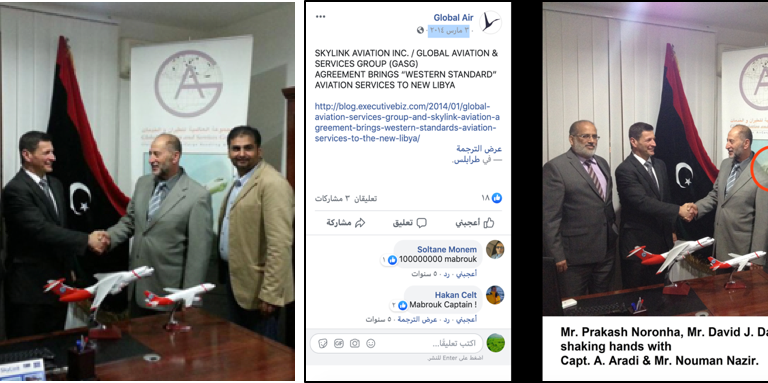
GASG seemingly re-branded to Global Air in 2006, according to the date listed on the GASG Facebook account (now re-branded to Global Air). Despite the alleged name change, the company is still identified as “Global Aviation and Service Group (GASG)” in the mission and vision sections of the new Global Air Facebook Account as displayed below.
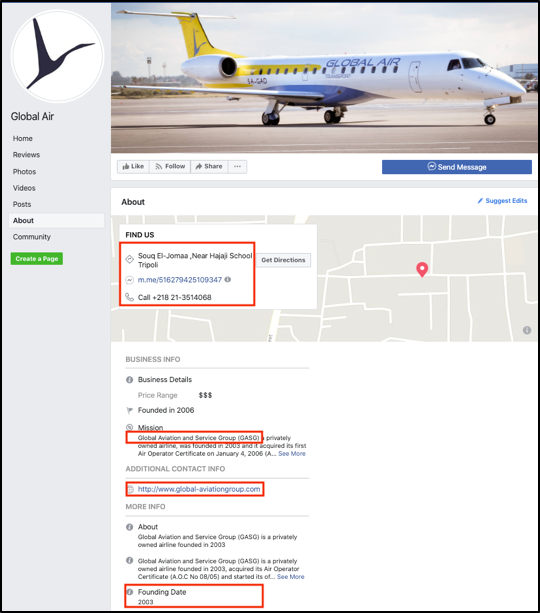
Additionally, the contact information listed on the new Global Air Facebook account matches the physical address and contact phone number listed on both the GASG and Global Air websites.
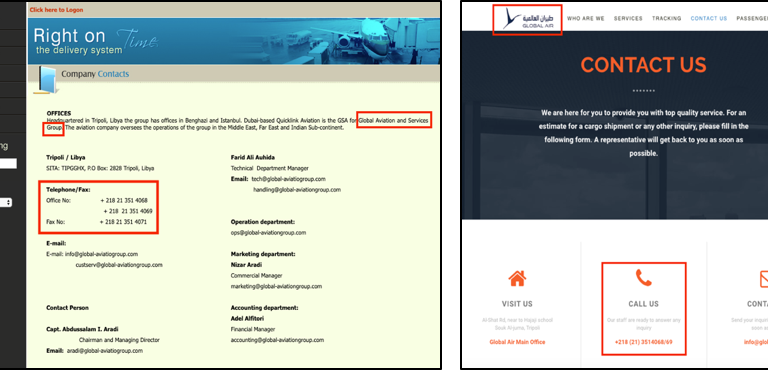
Separately, at least one flyer posted on the GASG Facebook account displayed both the “Global Air” logo and the GASG web address www.global-aviationgroup.com within the same image. This flyer also included the same contact phone number that appeared on the GASG and Global Air websites, suggesting that the two companies are potentially linked despite the change in name and logo.
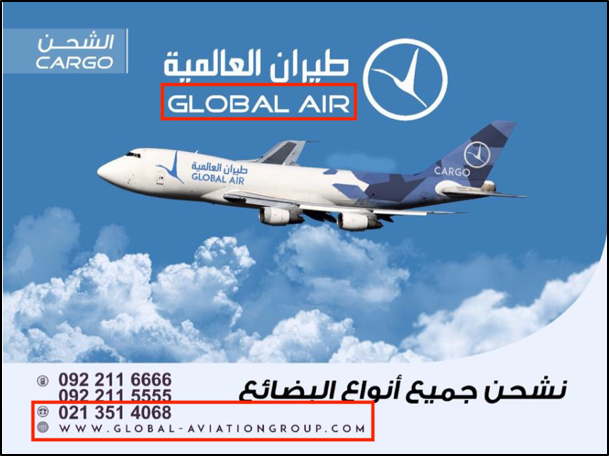
Additional images posted on the GASG Facebook account suggest that the change in company logo coincided with the migration from GASG to Global Air. A thorough survey of these images revealed multiple photos bearing both the GASG and Global Air logos as displayed below. In some cases, some of the images retained the full mention of “Global Aviation & Services Group” with a “Global Air” logo appearing at the borders.
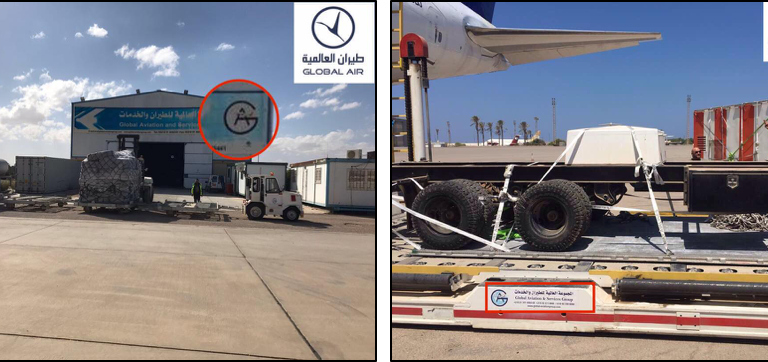
The Mitiga-Baidoa Connection #
C4ADS investigators reviewed additional images posted on the GASG/Global Air Facebook account and the account registered to “Abdussalam Aradi” and found an image of an Ilyushin-76 which matched the aircraft identified by UN investigators in 2006, and again 2013, as the transport aircraft for military equipment sent to Somalia and Libya in potential violation of existing UN restrictions.
The Facebook account registered to “Abdussalam Aradi” contained an image of an Ilyushin IL-76TD cargo aircraft (Registration Number: 5A-DQA) bearing the Arabic inscription for Global Air (العالمية للطيران) on the front left side of the aircraft as displayed below.
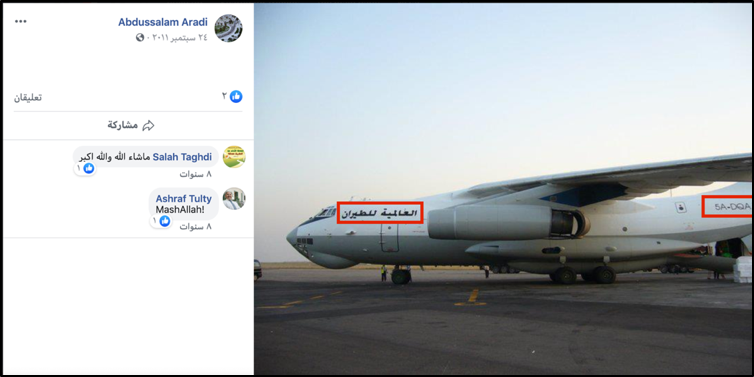
The same aircraft appeared on an August 23, 2013 post on GASG’s Facebook account, this time photographed with the English “Global Air” visible on the front side of the aircraft as displayed below. While both images lacked Exif data, aircraft spotters have elsewhere attributed the aircraft to GASG in public sightings in both Mitiga and Benghazi in 2007 and 2008 respectively. These sightings seemingly confirm the aircraft’s link to GASG as well its operations in Mitiga specifically, and in Libya at large.
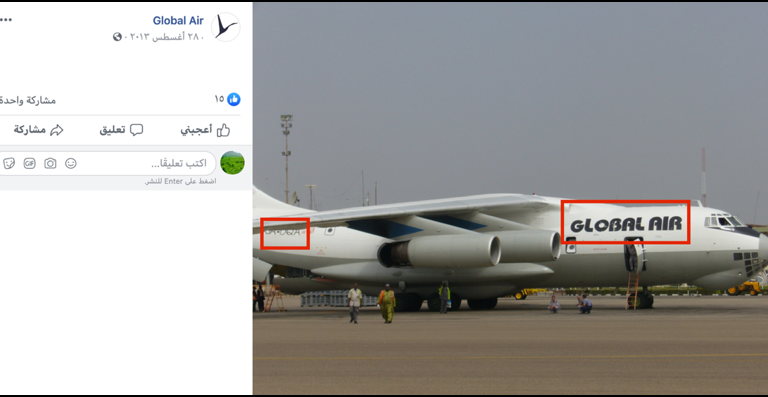
Global Aviation and Services Group (GASG) Links to Turkey #
Further open source review of GASG’s global operations revealed corporate ties to Turkey as well flight operations elsewhere in Libya, Turkey, and the UAE. According to the company’s website, GASG operated direct cargo flights from Istanbul to Tripoli and Benghazi as well as from Dubai to various other African destinations, specifically Njdamena (Chad). GASG’s website also included several flight schedules for international flights between Sabiha International Airport (Turkey) to Mitiga (Libya). Flights between Benghazi and Dubai operated three days a week while those between Sabiha (Turkey) and Mitiga (Libya) operated twice a week.
A March 23, 2007 filing in the Turkish Gazette confirmed the registration of “Global Aviation and Services Group” (listed as Merkezi Libya ‘Da Bulunan Global Aviation and Services Group Türkiye İstanbul Şubesi) under registration number: 619595. The gazette filling also identifies a “Kaptain Abdusalam Ibrahim Aradi” as the company’s general manager, confirming GASG’s corporate presence in Turkey.
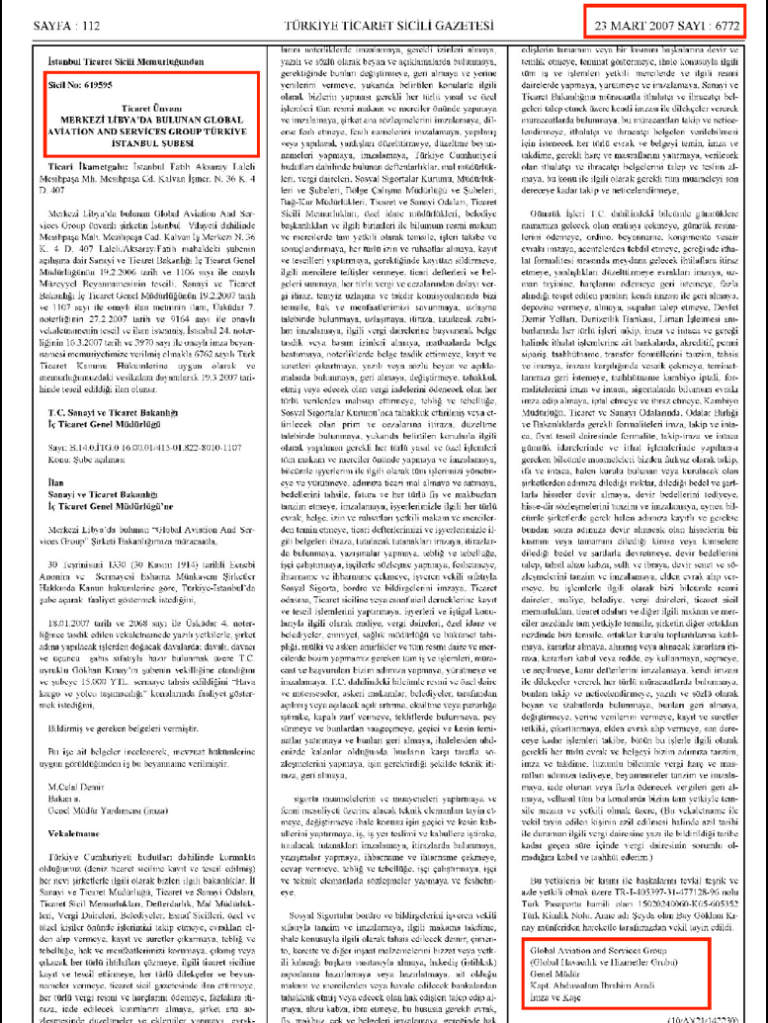
The Moldovan Connection #
In 2017, UN investigators reported that Global Aviation and Services Group (GASG) had previously chartered aircraft owned and/or operated by Moldovan company AerotransCargo. The company was registered on August 12, 2011 (Registration Number: 1011600028436) at MD-2026, bd. Dacia 60/5, ap.(of.) 115, sec.Botanica, mun. Chişinău, RM according to the Moldovan company gazette. This address is shared with another Moldova-based company, Air Stork (Registration Number: 1015600032031). Air Stork was established on September 30, 2015 and according to corporate documentation shares some directors and personnel with Aerotransport.
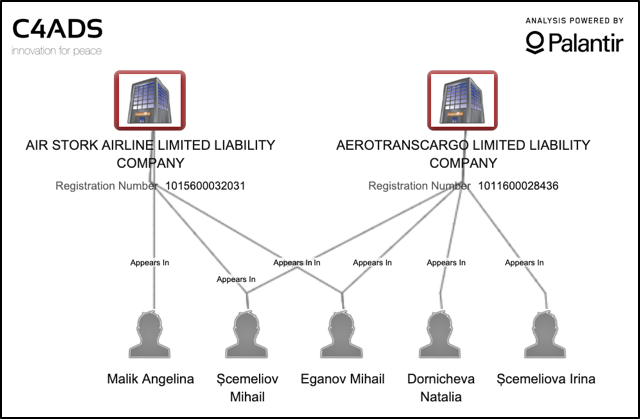
AerotransCargo and Air Stork also share the same address: MD-2026, bd. Dacia 60/5, ap.(of.) 115, sec.Botanica, mun. Chişinău, RM with five additional companies: Tiramavia Air Transport Company SRL, Tehnoaer LLC, Gelfex-M LLC, Alanar Grup LLC, and Valan Voiaj LLC. Four of the five companies operate in the air transport sector and provide passenger and freight transport services, warehousing, and the supply and repair of flight equipment. C4ADS investigators found similar co-location in other air freight service providers located in Moldova, which like GASG, Aerotranscargo, and Air Stork connect Libya to Eastern Europe.
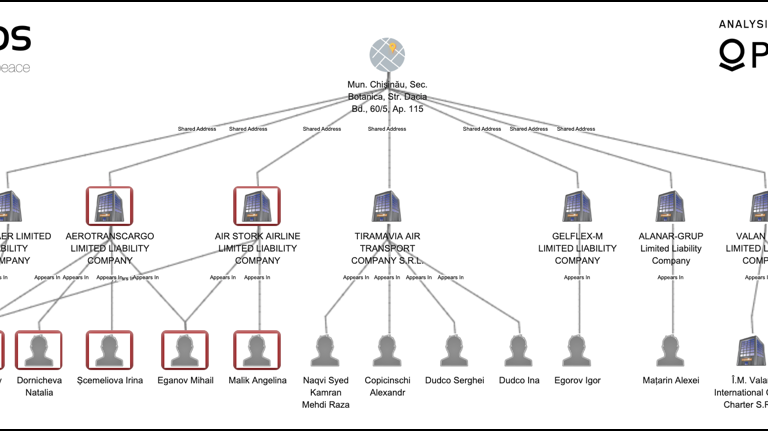
On April 15, 2019, the European Union banned Air Stork from operating within EU airspace. This restriction, however, did not include AerotransCargo, potentially allowing Air Stork aircraft to fly under AerotransCargo’s operator code. As noted above, both companies are also co-located and share some of the same owners. In 2017, UN investigators found that at least two Air Stock aircraft – Registration Numbers: ER-IBI and ER-IBU – had been transferred from another Moldovan company – Sky Prim Air – whose aircraft was sighted transporting officers and armed groups allied to General Khalifa Haftar’s Libyan National Army in 2016.
Additionally, at least one other Air Stork freight aircraft–Registration Number: ER-ABE–was leased to Global Aviation and Services Group on September 19, 2017. A rendered model of this aircraft appears on GASG’s new “Global Air” webpage. An aircraft with tail code ER-ABE was also spotted on April 4, 2018 traveling between Istanbul Sabiha Goken Airport and Misrata International airport by Plane Finder, an open source flight data aggregator.
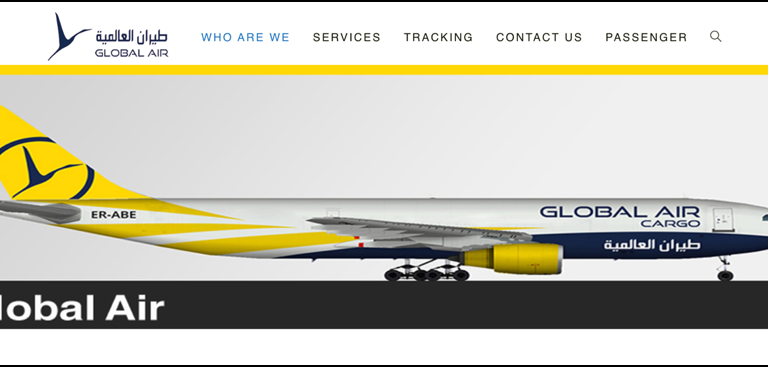
GASG and AerotransCargo’s Forays into Libya #
According to the Moldovan aircraft registry, AerotransCargo operates four Boeing 747-412 cargo aircraft with the following registration and ICAO numbers: ER-BAM (ICAO: 504E27), ER-BBJ (ICAO: 504E43), ER-JAI (ICAO: 504E36), and ER-BAJ.
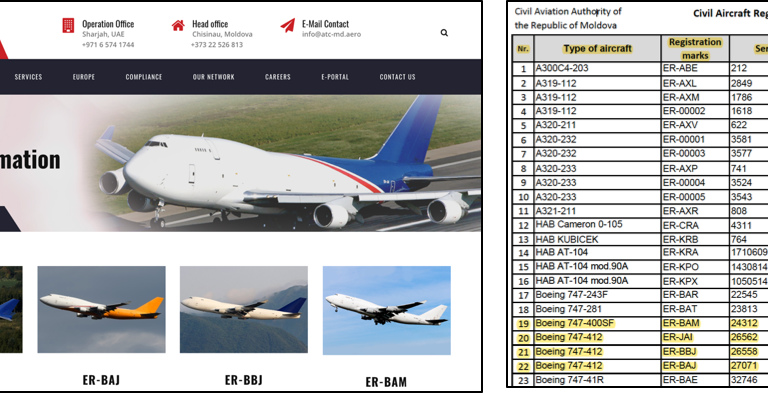
According to the Moldovan civilian aircraft registry, the AerotransCargo fleet operates under the following ICAO designator: ATG, which allows for the identification of individual flights operated by the airline. In 2017, UN investigators reported that GASG had previously chartered AerotransCargo aircraft on an undisclosed number of trips to Libya. These trips would have likely occurred under GASG’s ICAO designator: GAK making the relationship between GASG and AerotransCargo potentially visible in open flight data. Using flight data from ADS-B Exchange, C4ADS investigators found multiple flights by all four AerotransCargo aircraft flying under the GAK designator, including some that involved flights between Turkey and Libya.
This flight data also revealed that between April 19, 2017 and May 5, 2019, three of the four AerotransCargo aircraft – Registration Numbers: ER-JAI, ER-BBJ, and ER-BAM –used GASG call signs – GAK3011 and GAK3012 – during trips between Turkey and Mitiga International Airport in Tripoli, Libya.

While the available ADSB data is incomplete, each aircraft transmitted low altitude readings (between 25 and 50 feet) while near Mitiga airport, suggesting potential landing at the airport. Each of these aircraft also appeared on the Aerotranscargo webpage and were linked to the airline by the Moldovan civilian aircraft register though they operated under the GASG operator code during this time period. These findings seemingly confirm GASG’s use of Aerotranscargo aircraft as originally reported by the UN Panel of Experts.
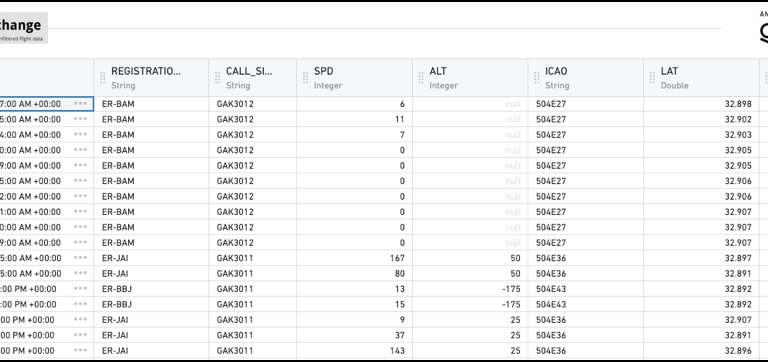
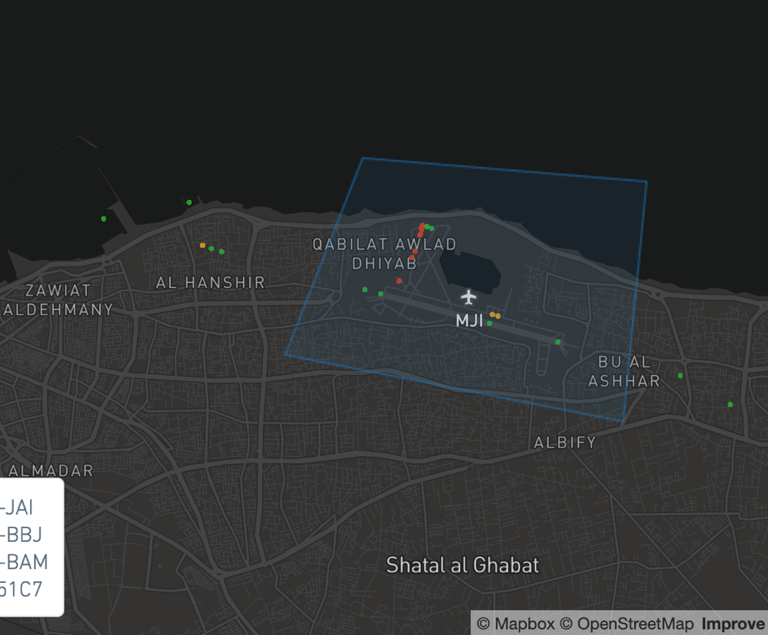
Whereas public reporting on weapons flows into Libya has dominantly relied on traditional reporting methods, ADS-B data provides an additional mode of verification and attribution not extensively used in conflict reporting. When combined with satellite imagery, ADS-B data opens up a new frontier in open source investigations, especially in data scarce environments.

